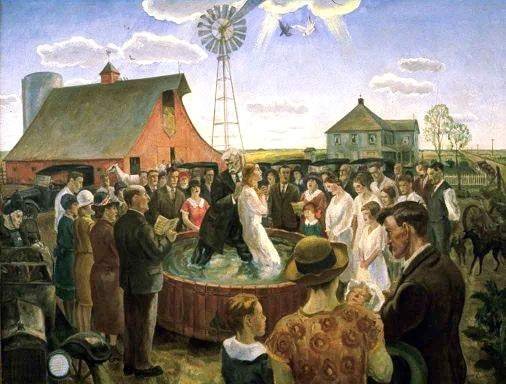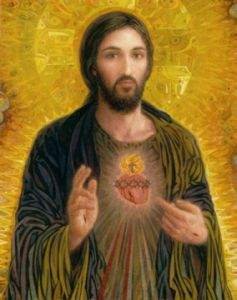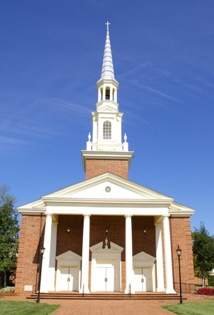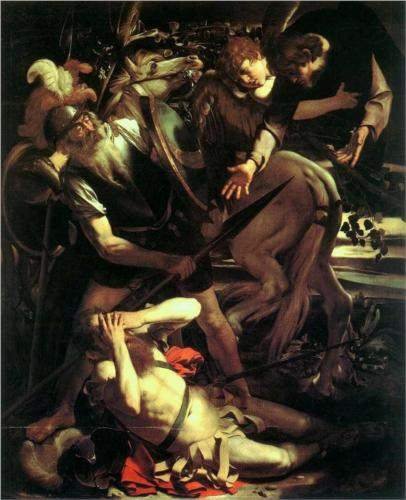My next post in the current series is already queued up and scheduled; but I think I’m going to delay it for a timely reflection that turns out to be quite apropos. [Part one. Part two.]

Baptism in Kansas (1928), by John Steuart Curry (WikiPaintings).
Last night I gave my testimony to a room full of Baptists. On Wednesday nights I attend a home care group at the home of my dear friends Josh and Wendy, ardent Christians and faithful Baptists. I grew up, and my faith was formed, among Baptists, and even now as a Catholic, I have a great and growing love for the Baptist tradition. And last night, we went around the circle as each member of the group shared his or her Christian testimony. As I closed mine, apologetically thanking my friends for their love and acceptance of me, “even though I’m a Catholic now, in a room full of Baptists,” one man spoke up and noted that we were a room full of Christians.
There’s one note that was a refrain through many of the testimonies of my Baptist friends, and I don’t wish to speak critically of it, but it made me thoughtful, and I thought I would comment on it from my own testimony: the quest for “assurance of salvation.” Baptists believe one can have assurance of one’s eternal destiny, “eternal security,” a faith that one’s eternal salvation is certain and cannot be taken away. But it seemed that for several of my friends, the search for this assurance was a struggle with uncertainty and doubt, until finally each received a confirmation. Several of them were raised in Christian homes and in church, and grew up knowing of the gospel; several of them had journeys of faith, even serving in the church, only to drift away or fall into sin, or later otherwise realize that they were “lost.” They then had dramatic moments at which they were “saved.”
But I know well, from my own life, the inconstancy of human flesh. I too was raised in a godly home, by godly parents, in a godly church; I knew the Lord from an early age; I grew up walking with Him; as a young man I was “on fire” for Him; and though I was immature and there was much I didn’t understand, I can say with fair certainty that I did know the Lord, that I trusted in Him and followed Him, and in the manner of speaking of Evangelicals, was “saved.” And yet I did fall away; I fell into serious sin; I walked away from God for a number of years. Was what I had before, then, as a young man, not real? Later on God called me back, and I did have dramatic conversion experiences, more than one of them; and yet that wasn’t the end of the road for me, either. I still struggled with sin, even fell in deeper than I ever had before, until I had an even further and deeper conversion to the Lord: not a single moment, but a highway landmarked with monuments of faith.
So it presents a number of questions: When was I “saved”? Did I “lose my salvation” those times I fell away? Did I never have “assurance” to begin with? My friends’ stories were each framed around the premise that there was a single moment at which they were saved, at which they received assurance; and yet I heard evidence that these people were following and serving the Lord even before those moments. And I seriously wonder that if any of them were to fall again into serious sin — a danger that I am sure they would admit — if they should “backslide” or fall away from the Lord — that they wouldn’t then have further and later moments, and that they wouldn’t then frame their testimonies around them, supposing that that time is when they were truly “saved,” or “recommitted” their lives to Him. Even the language and narrative of Evangelicals seem to admit that “salvation” is a journey, an ongoing conversion, even despite their conventions and focus on single moments.
Despite any assurance of salvation that one might hold at any given moment, it is possible that that person might backslide or fall away — and if he were then to die, at that point there would be uncertainty among those who knew him: Was he truly saved? Did he ever really have a saving faith? One camp, the Reformed, would say that his falling away was evidence that he didn’t; and whatever assurance he had at one time would seem to count for very little. Others, more Evangelical-minded, might say that because he did have assurance of a saving faith at one time, he must have been saved in the end. And yet that saving faith was not saving him toward the end of his life or bearing fruit.

Sacred Heart of Jesus, by Smith Catholic Art (prints available).
The standard Evangelical evangelistic question is, “If you died tonight, are you absolutely certain that you would go to heaven and be with Jesus?” I am glad that nobody asked me that question last night, because as a Catholic, they wouldn’t have liked my answer. No, I don’t have absolute assurance; but I stand in good company, and answer with the words of Paul: “I do not even judge myself; it is the Lord who judges me” (1 Corinthians 4:3–4). I trust in the promises of my Lord: “If you confess with your lips that Jesus is Lord and believe in your heart that God raised him from the dead, you will be saved” (Romans 10:9). “He who eats My Flesh and drinks My Blood has eternal life, and I will raise him up at the last day” (John 6:54). I know Him and trust in Him and have faith that “He who has begun a good work in [me] will complete it until the day of Jesus Christ” (Philippians 1:6). I have assurance that my Lord “will never leave [me] nor forsake [me]” (Hebrews 13:5, etc.); if there is any doubt, it is not in the Lord, but in my own fragile humanity. He gives us the grace in Him to stand and to abide; but He also gives us the free will to stand with Him or to walk away, to choose sin and death or His eternal life (Deuteronomy 30:19, Sirach 15:17).
Much ink has been spilled over the centuries over the question of whether we can be certain that we are in a state of grace, that we are justified and forgiven of our sins; and this doubt coincides with the doubts of “assurance” that I heard from my friends last night. But faith is from the Lord (Ephesians 2:8–10), and He does give assurance and confirmation in that faith that we are in Him. In that faith, I know that it is never God who will let go of me; and I can say with abiding faith that I will not let go of Him between now and the moment of my death, especially were that to come tonight. Now, then, and always, I can only throw myself upon His boundless grace: “Lord Jesus, Son of God, have mercy on me, a sinner.”



